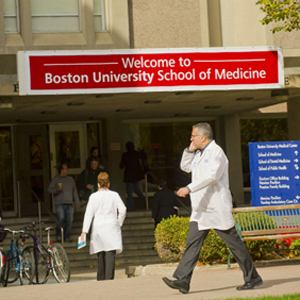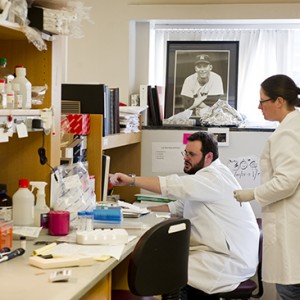BU’s health and medical education programs have been ranked 29th worldwide and 16th among US universities in the 2015–2016 Times Higher Education World University Rankings, a survey conducted by Thomson Reuters.
The rankings apply to the School of Medicine, the School of Public Health, the Henry M. Goldman School of Dental Medicine, Sargent College of Health & Rehabilitation Sciences, and the School of Social Work.
“The international rankings are based on publications, citations, and other performance metrics, as opposed to only reputation surveys,” notes Karen Antman, dean of MED and provost of the Medical Campus. “Reputations lag performance. We have invested substantially in faculty recruitment and shared core facilities that make expensive technology and instruments available to all faculty. When evaluated based on performance, we tend to do well.”
This year’s World University Rankings’ clinical, preclinical, and health table, according to the publication, “judges world-class universities across all their core missions.” To compile the rankings, 13 “carefully calibrated performance indicators” are studied in 5 specific categories: teaching (the learning environment), research (volume, income, and reputation), citations (research influence), international outlook (staff, students, and research), and industry income (knowledge transfer).
The top schools in this year’s clinical, preclinical, and health category were the University of Oxford at number one, Harvard University at number two, and the University of Cambridge at number three. BU was ranked between Heidelberg University and the University of Chicago.
The Times rankings “are especially noteworthy, as they use a broad range of weighted measures to derive these rankings,” says Christopher A. Moore, dean of Sargent College. “These metrics align well with the outcomes we use in our own self-assessment, so we’re thrilled with this recognition of BU’s programs. Sargent’s focus on generating innovative, translational, and groundbreaking research supports our equally high-achieving educational programs in the health professions.”
BU had an overall score of 79.3 out of 100, and earned a score of 95.1 for citations, a measure of research influence.
“Framingham Heart Study investigators are among our most cited faculty,” Antman notes. “They have large numbers of publications with many citations. Many of our other research programs do well too. So we have both breadth and depth.” The Framingham Heart Study is the nation’s longest running epidemiological study. Begun in 1948 and supported by the National Heart, Lung, and Blood Institute, it has been run by BU since 1971.
In other Times categories, BU ranked 52nd in physical sciences (tied with the University of British Columbia), 74th in social sciences, and 87th in engineering and technology. The University was listed 64th overall among the world’s top 100 universities.
















































What about the grad school of mgt (healthcare care mgt MBA)?
Thanks.